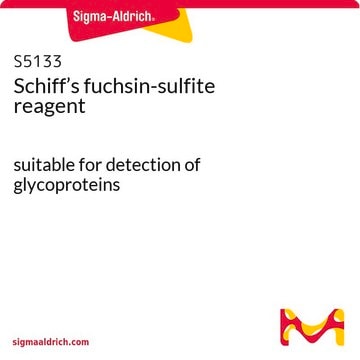About This Item
Recommended Products
Assay
99.999% trace metals basis
form
crystals
reaction suitability
reagent type: oxidant
mp
122 °C (lit.)
solubility
water: soluble
SMILES string
OI(O)(O)(O)(O)=O
InChI
1S/H5IO6/c2-1(3,4,5,6)7/h(H5,2,3,4,5,6,7)
InChI key
TWLXDPFBEPBAQB-UHFFFAOYSA-N
Looking for similar products? Visit Product Comparison Guide
Related Categories
General description
Application
- In the oxidative cleavage of 1,2 diols and epoxides to ketones or aldehydes.
- For the oxidation of alcohols to ketones or aldehydes in the presence of pyridinium chlorochromate as a catalyst.
- For the oxidation of sulfides to sulfones using chromium(VI) oxide catalyst.
- For the oxidation of naphthalenes and anthracene to quinones using chromium(VI) oxide catalyst.
- In the synthesis of polyaniline (Pani) by chemical polymerization.
- N-nitrosation of secondary amines using various heterogeneous catalysts in the presence of Na2NO3.
- In combination with sodium bisulfate for the preparation iodohydrin substituents by the addition of I-OH to alkenes.
Signal Word
Danger
Hazard Statements
Precautionary Statements
Hazard Classifications
Aquatic Acute 1 - Aquatic Chronic 1 - Eye Dam. 1 - Ox. Sol. 1 - Skin Corr. 1B - STOT RE 1 Oral
Target Organs
Thyroid
Storage Class Code
5.1A - Strongly oxidizing hazardous materials
WGK
WGK 3
Flash Point(F)
Not applicable
Flash Point(C)
Not applicable
Personal Protective Equipment
Certificates of Analysis (COA)
Search for Certificates of Analysis (COA) by entering the products Lot/Batch Number. Lot and Batch Numbers can be found on a product’s label following the words ‘Lot’ or ‘Batch’.
Already Own This Product?
Find documentation for the products that you have recently purchased in the Document Library.
Customers Also Viewed
Our team of scientists has experience in all areas of research including Life Science, Material Science, Chemical Synthesis, Chromatography, Analytical and many others.
Contact Technical Service

















